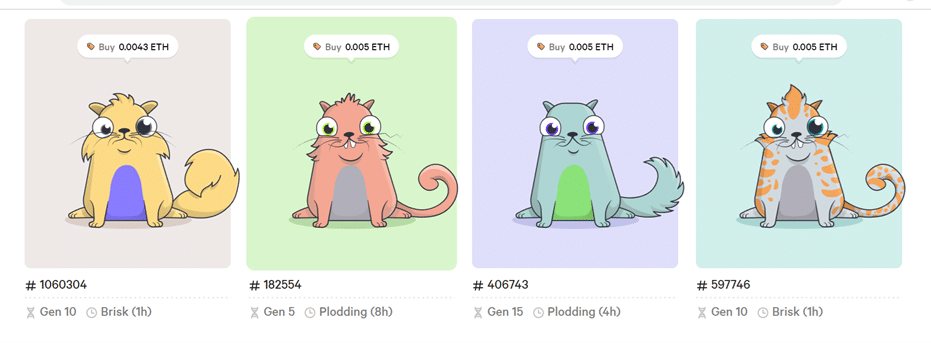The decentralized application (DApp) market is booming, with the global blockchain technology market expected to reach $39.7 billion by 2025, according to a report by MarketsandMarkets™. With this growing demand, the need for skilled DApp developers is also on the rise. But when it comes to adding talent to your development team, should you opt for freelance or full-time professionals? In this blog post we explore the pros and cons of hiring freelance vs. full-time DApp developers. How each can affect your project’s scope, quality, and timeline. We illustrate with real-world examples and success metrics to help you arrive an informed decision for your business.
Freelance DApp Developers

A freelance DApp (Decentralized Application) developer is a self-employed professional who offers their skills and services on a project-to-project basis rather than being employed by a single organization. These developers are experienced in blockchain technologies and may specialize in specific areas such as smart contract development, front-end and back-end integration, or specific blockchain platforms like Ethereum, Binance Smart Chain, or Cardano. Freelancers typically work remotely and may serve multiple clients simultaneously.
Level of Commitment
Working Hours
Freelance DApp developers have a flexible schedule, meaning they can work during hours that suit them or their clients. The number of hours they commit to a project is usually determined by the project requirements and the agreement between the developer and the client.
Short-Term and Task-Specific Engagement
Freelancers often work on short-term projects or specific tasks. They are usually not involved in long-term planning or company strategy, making their commitment often project- or task-based rather than time-based.
Compensation Structure
Freelance DApp developers can be paid in various ways:
- Per Hour: Some freelancers charge by the hour, especially for long-term or ongoing projects where the scope might change over time.
- Per Task/Milestone: For projects with well-defined tasks and deliverables, freelancers may charge per task or milestone achieved. This payment model is common in project-based engagements.
- Retainer Basis: In some cases, freelancers may agree to a retainer fee for an ongoing relationship with the client, guaranteeing a certain number of work hours per week or month.
Level of Intensity and Quality of Work
The level of intensity and the quality of work can vary among freelance DApp developers:
- High-Intensity, Short-Term Focus: Freelancers often have to work on tight deadlines and may exhibit a high level of intensity and focus to complete tasks quickly.
- Quality Variances: While some freelancers deliver exceptional work and take immense pride in what they produce, others may view their freelance status as a means to an end, potentially impacting the quality of the output.
- Lack of Long-Term Alignment: Unlike full-time developers who have a vested interest in the long-term success of a project, freelancers may not have the same level of commitment, which could affect the quality in some cases.
The pros and cons of hiring a Free lance DApp Developer
Pros
- Cost-Effectiveness: Hiring freelancers eliminates the need for additional overhead costs like benefits, insurance, and office space. Websites like Upwork or Toptal offer a variety of talent to choose from, fitting a range of budgets.
- Flexibility: Freelancers often work across multiple time zones and schedules, offering flexibility that may not be possible with a full-time employee.
- Specialized Skill Sets: Freelancers are often experts in specific domains, enabling you to tap into niche skills for specific projects.
- Rapid Scaling: Freelancers can be added or removed from a project quickly, allowing for easier scaling.
Cons
- Lack of Control: You have less managerial oversight with freelancers, which could be a concern for long-term projects.
- Quality Risks: The skill level of freelancers can vary, and the short-term nature of freelance work might not encourage deep commitment to your project.
- Intellectual Property Concerns: Handling confidential information and IP can be more complex with freelancers, requiring additional legal frameworks.
As of late 2021 it seem , it’s relatively rare for a DApps developments to heavily rely on freelancers, mainly due to concerns around quality assurance, project management, and intellectual property. However, there are smaller-scale DApp projects or early-stage startups that have utilized freelancers for significant portions of their development.
Below are hypothetical examples, inspired by the types of DApp projects that have been common in the blockchain space, which could potentially be developed primarily by freelance talent:
Example 1: Decentralized Art Marketplace
Project Overview: This hypothetical DApp allows artists to mint and sell NFTs (Non-Fungible Tokens) of their artwork, without the need for a centralized authority or platform.
Freelance Contributions: Freelancers could be responsible for various components such as smart contract development, front-end design, and blockchain integration. The smart contracts could be developed by a Solidity expert, while the front-end could be designed by a freelance UI/UX designer.
Why Freelancers: The project is highly modular, allowing individual components to be developed in parallel. This makes it suitable for a freelance model where different experts can work on different modules independently.
Example 2: Decentralized Betting Platform
Project Overview: A platform that allows peer-to-peer betting on the outcome of events in a decentralized manner, utilizing smart contracts to handle the bets and distribute the winnings.
Freelance Contributions: A freelance blockchain developer could be responsible for writing the core betting smart contracts, while another freelance developer focuses on creating a user-friendly interface. Another freelancer could be responsible for the integration of a decentralized oracle service to confirm event outcomes.
Why Freelancers: The project scope is defined and specific, requiring specialized skills that can be found among freelancers. The project can also be broken down into well-defined tasks suitable for freelance work.
Example 3: Decentralized Crowdfunding Platform
Project Overview: A platform that enables decentralized crowdfunding campaigns, allowing users to raise funds for projects without the oversight of a centralized entity.
Freelance Contributions: Smart contracts to handle the funds could be developed by a freelance Solidity developer. The front-end web application could be built by a freelance JavaScript developer familiar with Web3. Another freelancer could be hired for integrating a decentralized identity solution.
Why Freelancers: The project has multiple components that can be developed independently, making it easier to delegate tasks to specialists in those areas.
While these are fictional examples, they illustrate the types of projects that could potentially leverage freelance talent effectively. Always remember that while freelancers can be an asset, a well-coordinated project management strategy is essential to bring the disparate pieces together into a cohesive, functional DApp.
Hiring Full-Time DApp Developers
A full-time DApp (Decentralized Application) developer is a professional who is formally employed by a company and works on developing, maintaining, and improving blockchain-based applications. These developers are skilled in programming languages like Solidity for Ethereum-based applications, and they may work on other blockchain platforms such as Binance Smart Chain, Cardano, or Polkadot. In addition to coding, their role may also involve architecture design, smart contract development, front-end and back-end integration, and debugging.
Hiring a full-time DApp Developer offers benefit like more cohesive and collaborative teams
Level of Commitment
Working Hours
The number of working hours for a full-time DApp developer can vary depending on the country and company policy but generally falls within the range of 35-40 hours per week. In some fast-paced startups or during critical project phases, the working hours might extend, sometimes requiring weekend work or overtime.
Being a full-time employee usually means a long-term commitment to a company.
Skill Development
Companies usually invest in the continuous learning and development of their full-time staff, which might include workshops, courses, or attending relevant conferences. This is not only beneficial for the employee but also ensures that the team stays updated with the latest technologies and best practices in the rapidly evolving blockchain space.
Project Ownership
Full-time developers typically have a strong sense of ownership and alignment with the company’s mission and goals. This is crucial in DApp development, which often requires iterative work and long-term vision.
The pros and cons of hiring a Full-Time DApp Developer:
Pros
- Team Cohesion: Full-time employees are more integrated into your company culture and long-term vision, leading to better teamwork and cohesion.
- Quality & Consistency: With a full-time team, you have more control over the development process, ensuring higher quality and consistency.
- IP Security**: Intellectual property and confidentiality are easier to manage.
- Continuous Development: Full-time developers can pivot or iterate quickly, reacting to market trends or customer feedback in real-time.
Cons
- Higher Costs: Salaries, benefits, and overhead costs can add up quickly, especially if you are located in a region with high living costs.
- Limited Skill Set Your full-time employees may not have the specialized skills for every project, requiring training or external consultants.
- Inflexibility: Full-time staff generally work on a fixed schedule and may not be available during off-hours for urgent tasks.
Example of project that use full-time DApp Developers.
These projects often value the cohesion, long-term commitment, and focused expertise that full-time developers bring. Below are examples of such projects:
- Augur, a decentralized prediction market, opted for a full-time development team to ensure consistent quality and long-term vision. Their ability to iterate and adapt their platform has been cited as a significant factor in their success.
Uniswap: Project Overview: Uniswap is a decentralized exchange that allows users to trade various cryptocurrency tokens directly from their wallets. It has become one of the most popular decentralized finance (DeFi) projects.
- Full-Time Contributions: Uniswap has a dedicated team of full-time developers that have continued to iterate on the project, releasing multiple versions since its inception.
- Success Metrics: Uniswap is one of the leading DEXs (Decentralized Exchanges) and frequently handles hundreds of millions of dollars in trading volume daily. The success of Uniswap can be attributed to the consistent quality and innovative features that a committed, full-time team can deliver.
Chainlink : Project Overview: Chainlink is a decentralized oracle network that enables smart contracts to securely interact with real-world data and services.
- Full-Time Contributions: Chainlink has a strong team of full-time developers, data scientists, and other professionals. Their collective focus has been on creating a robust, secure, and versatile oracle network.
- Success Metrics: Chainlink’s oracles are widely used in the DeFi space, and the project has formed partnerships with many high-profile companies and other blockchain projects. The sustained growth and ecosystem development are indicative of the team’s full-time commitment.
MakerDAO:Project Overview: MakerDAO is a decentralized autonomous organization that governs the Maker Protocol, including the DAI stablecoin, which aims to keep a stable value relative to the U.S. Dollar.
- Full-Time Contributions: MakerDAO has a dedicated team working full-time on governance, smart contract upgrades, and maintaining the stability of DAI.
- Success Metrics: DAI has become one of the most widely used stablecoins in the cryptocurrency market. The project’s resilience, even during highly volatile market conditions, can be seen as a testament to the value of a dedicated, full-time team.
Each of these projects has demonstrated the potential advantages of employing a full-time development team, including long-term vision, consistency, and quality. Their significant impact and success within the blockchain space underscore the potency of this approach.
Hybrid Models: Best of Both Worlds?
Many companies adopt a hybrid model, employing a core team of full-time developers while outsourcing specific tasks to freelancers. This allows organizations to be flexible and cost-effective while maintaining a level of control and quality.
Example of companies that use both full-time and freelance DApp Developer
CryptoKitties, one of the first successful DApps, was built by a core team but also involved freelance developers for specific tasks like smart contract optimization. This hybrid approach allowed them to move quickly without compromising on expertise.
Crypto-Kitties-one-of-the-first-successful-DApps
Conclusion
The decision between hiring freelance and full-time DApp developers comes down to your specific needs, the nature of your project, and your long-term vision. Freelancers offer cost-efficiency and flexibility, ideal for short-term or specialized projects. On the other hand, full-time developers offer consistency, quality, and better integration with your company’s objectives.


